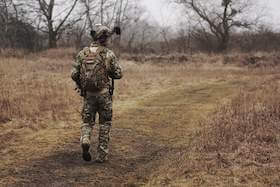CANNABIDIOL (CBD) FOR SLEEP
Jared D. Hoffman, PhD
The ability to fall and stay asleep in this modern age has become more and more difficult. This is in part due to our hectic lifestyles and being blasted with blue light and sources of entertainment from our phones, TVs, and computers. According to the National Sleep Foundation, adults need 7-9 hours of sleep with children and teenagers needing even more.1 A review by Watson et al. found that getting too little sleep (<7 hours of sleep a night) was associated with obesity, diabetes, heart disease, depression, greater risk of accidents, and an overall increased risk of death. Getting consistently greater than 9 hours of sleep was also associated with an increased health risk.2 Nonetheless, getting the right amount sleep is one of the most important investments we can make on our health. To further showcase the importance of sleep, it is noteworthy that sleeping is highly conserved across animals with few exceptions, despite it being a period where searching for food or reproducing does not occur.
Sadly, sleep complaints are one of the most common medical complaints in the United States. Many people will look for therapeutics to help them wind down and get to sleep. Not only this but sleep disorders themselves are an issue for many people. An example of this is rapid eye movement (REM) sleep behavior disorder, which is characterized by abnormal behaviors that occur during REM sleep. Interestingly, our sleep is divided into cycles of REM and non-REM sleep with non-REM sleep further divided into N1, N2, and N3 (deep) sleep. REM sleep is when dreams occur and when the body is basically paralyzed. It usually begins soon after the deep sleep state ends. These sleep cycles last around 90 minutes and occur 4-6 times over the course of a night. Unfortunately, medications for sleep tend to produce unwanted side effects and may even limit the quality of sleep and decrease the amount of time spent in the REM stage. Thus, the need for therapeutics that improve not only the duration of sleep but also the quality is extremely important. One such potential product gaining attention is cannabidiol (CBD), a non-psychoactive endocannabinoid found in the Cannabis plant, which has gained substantial popularity of late in the general public. There is only limited preclinical and human research available using CBD for sleep, but results have been promising enough to warrant further investigation.
Preclinical Research
CBD has been used in a variety of different animal models to investigate its effects on sleep. One study by Chagas et al., found that after injecting rats with CBD, sleep was significantly increased in groups given 10 mg/kg bodyweight and 40 mg/kg bodyweight compared to the placebo.3 In contrast to these findings, other studies have found CBD to increase wakefulness for reasons that are not entirely clear.4 Confusingly, the dosage, whether high or low, may impact if CBD has a stimulating or sedating effect. More research needs to be conducted to elucidate this.
Research in Humans
There has been some evidence in humans that CBD can impact sleep as it may have a sedating effect. Also, it has been demonstrated that even 300 mg/day, a fairly high dose of CBD, did not have any negative effects on the sleep architecture or sleep cycle of healthy volunteers.5 This indicates that it may indeed be safe to use for sleep even at doses that are on the higher side. One recent study by Shannon et al. looked at whether CBD was able to improve sleep in adult patients with around 80% of the patients having a documented anxiety or sleep diagnosis.6 The patients were given 25 to 75 mg/d of CBD in capsule form either in the morning or evening after a meal. Sleep was assessed every month and overall, there was a mild improvement in sleep reported in this study. These improvements in sleep due to CBD were primarily only within the first month. The next two months of the study found fluctuating results. Notably, this study also looked at anxiety and found CBD to decrease anxiety scores in the study population. Since anxiety can hamper sleep, decreasing levels of anxiety may conceivably help improve sleep as well. Notably, CBD was also considered safe and well-tolerated in this study. However, there was no control group and patients knew if they were taking CBD, which makes it difficult to draw any definitive conclusions about the results.6
Next, one study found 160 mg of CBD to increase the duration of sleep although the dream recall of the participants was reduced.7Furthermore, another study that was a randomized, double-blind, placebo-controlled, crossover controlled trial investigating CBD alone, tetrahydrocannabinol (THC) alone, and THC in a 1:1 combination with CBD found all groups to have increased sleep quality.8 A study by Chagas et al. also found that in those Parkinson’s disease, 300 mg of CBD decreased REM sleep disorder behavior and also found improvements in a well-being and quality of life questionnaire. Notably, the groups with THC containing treatments found the most advantages but CBD alone saw benefits as well.9 THC is the primary psychoactive component of Cannabis and it is known that CBD and THC interact. Due to this, it is difficult to pin down if the benefits found were because the two cannabinoids were working synergistically and exactly how much of the benefits actually came from CBD. It is possible that THC alone may even show different results on sleep than CBD does. Collectively, the research using CBD for sleep in humans is still in its initial stages and more well-designed clinical trials need to be conducted.
The use of CBD for sleep has gained immense popularity over the last couple years. The overall preclinical research and research in humans is limited but there are a handful of studies have shown modest benefits. Unfortunately, there are no current clinical trials ongoing using CBD in sleep, but this could certainly change in the near future.
Please talk to your doctor to see if CBD is right for you and your sleep before starting a CBD regimen.
References
1. https://www.sleepfoundation.org/press-release/national-sleep-foundation-recommends-new-sleep-times
2. Watson NF, Badr MS, Belenky G, et al. Recommended Amount of Sleep for a Healthy Adult: A Joint Consensus Statement of the American Academy of Sleep Medicine and Sleep Research Society. 2015;38(6):843-844.
3. Chagas MH, Crippa JA, Zuardi AW. Effects of acut systemic administration of cannabidiol on sleep-wake cycle in rats. J Psychopharmacol. 2013;27(3):312-6.
4. Murillo-Rodriguez E, Millán-Aldaco D, Palomero-Rivero M. Cannabidiol, a constituent of Cannabis sativa, modulates sleep in rats. FEBS Lett. 2006;580(18):4337-45.
5. Linares IM, Zuardi AW, Periera LC. Cannabidiol presents an inverted U-shaped dose-response curve in a simulated public speaking test. Braz J Psychiatry. 2019;41(1):9-14.
6. Shannon S, Lewis N, Lee H, et al. Cannabidiol in Anxiety and Sleep: A Large Case Series. Perm J. 2019;23:18-041.
7. Zhornitsky S, Potvin S. Cannabidiol in humans-the quest for therapeutic targets. Pharmaceuticals (Basel). 2012;5(5):529-52.
8. Notcutt W, Price M, Miller R. Initial experiences with medicinal extracts of cannabis for chronic pain: Results from 34 ‘N of 1’ studies. Anaesthesia. 2004;59(5).
9. Chagas MH, Zuardi AW, Tumas V. Effects of cannabidiol in the treatment of patients with Parkinson’ disease: An exploratory double-blind trial. 2014;28(11):1088-1098.
ALSO IN RESOURCES
CANNABIDIOL (CBD) FOR ATHLETICS
CANNABIDIOL (CBD) FOR ATHLETIC PERFORMANCEJared D. Hoffman, PhD Athletes, both professional and recreational, are always looking to gain an edge and push their performance in their respective sport to new levels. Often times, athletes will go to great lengths to do...
HOW TO DOSE CANNABIDIOL (CBD)
HOW TO DOSE CANNABIDIOL (CBD) Jared Hoffman, PHD Cannobidiol (CBD), a cannabinoid found in cannabis, is currently a hot topic among the general public and in the scientific community with new studies utilizing CBD in a variety of different disease states.1 Due to this...
CANNABIDIOL (CBD) FOR PTSD
CANNABIDIOL (CBD) FOR POST-TRAUMATIC STRESS DISORDERJared D. Hoffman, PhD Cannabidiol (CBD) is a non-psychotomimetic cannabinoid found in the Cannabis plant. CBD, along with tetrahydrocannabinol (THC), the well-known psychoactive component of Cannabis, are just two of...
838 E High St, Suite 268, Lexington Ky 40502
© 2019 On Duty CBD.
This product is not for use by or sale to persons under the age of 18. This product should be used only as directed on the label. It should not be used if you are pregnant or nursing. Consult with a physician before use if you have a serious medical condition or use prescription medications. A doctor’s advice should be sought before using this and any supplemental dietary product. All trademarks and copyrights are property of their respective owners and are not affiliated with nor do they endorse this product. These statements have not been evaluated by the FDA. This product is not intended to diagnose, treat, cure or prevent any disease. By using this site, you agree to follow the Privacy Policy and all Terms & Conditions printed on this site. Void Where Prohibited by Law.




